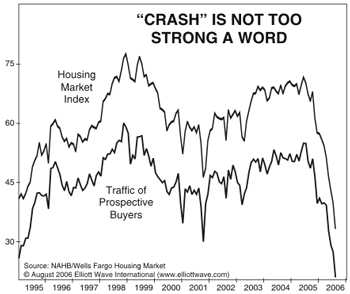The following paragraph seems to be right out of Conquer the Crash. “These factors are largely the result of an increasing number of potential buyers adopting a 'wait and see' attitude because of uncertainty about where the housing market is headed."
--Ryan Gordon
Good Morning America did a spot on pending job cuts in America. They were making recommendations about what people can do to prepare for this. One was to have 2-3 mos living expenses in savings. And the final one...I couldn't believe my ears...”Go out and get a home equity line of credit now because they won't give you one when you are unemployed.” Obviously assuming that the value of your home will never go down! Ouch! We are really in for it.
--Eugene Fina

This chart shows the latest, even deeper plunge of the Housing Market Index and Traffic of Prospective Buyers. The latests data on housing starts confirms that a massive reversal is in place. Starts fell 13% from a year earlier while permits were down an even more dramatic 21%. Permits hit a record high in September 2005, while starts reached a seasonally-adjusted record in January of this year. A Reuters article from August 13 reveals that while the C-word is not yet in vogue, observers are starting to find some words to coinvey what's happening:
"Steeply deteriorating." "Hard landing." "Kaput." These are some of the terms used by analysts to describe the slowing of the U.S. housing market.
The article, “U.S. Homeowners Say ‘Downsize Me!’” also provides ample evidence of the emerging conservatism called for in recent issues of EWFF and the Sociotimes entry of July 28. According to Reuters it’s suddenly dawning on Americans that they “are carrying a lot of excess weight and desperately want to slim down -- in the size of their homes.” “Our property taxes went down by 1,000%, the ConEd (bill) was cut by two-thirds and the cost of home maintenance was reduced by at least 50%,” says a semi-retired man who just moved from a 2,200 square-foot home to a 1,200 square-foot apartment. “No gardener, no roofer cleaning gutters, no tree spraying, no snow removal, no exterior painting every six or seven years." In Florida, “homebuyers are losing interest in size altogether.” From 1970 to 2005, the average number of occupants per household decline from 3.11 people to 2.59, but over the same span, the size of the average home rose from 1,500 square feet to more than 2,400. “Homes are larger than need to be and more than [many homeowners] can handle.” This realization could have come at any point in the last 20 years; but it didn’t because people’s home buying decisions were not guided by the logic of necessity. They were driven by the expansive psychology of the old bull market, which is now succumbing to its alter ego. As we have noted many times, third waves are recognition waves in which the fundamentals respond in very robust ways. By noting that some are “sensing now may be the right time to get the best price before the market cools further,” the article points out, however, that recognition doesn’t happen all at once. Some see the reality sooner and reap the benefits.
|
